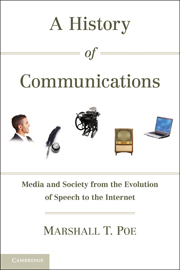3 - Homo Lector
Humanity in the Age of Print
Published online by Cambridge University Press: 05 June 2012
Summary
The rulers will need to use a quite considerable amount of falsehood and deception for the benefit of those ruled. But we said, I think, that all such things are useful only in the form of medicine.
– Plato, The Republic, 459CPlato believed that the only way to get to the Truth was by dialogue. Stentorian monologues wouldn't do the job, and neither would fancy writing. You had to talk to someone if you were really going to get to the bottom of anything. But talking wasn't all you had to do. Anyone could talk. In order to pursue philosophy, Plato said, you also had to have the right intellectual stuff. You needed to be smart and love – really love – the Truth. These intellectual and emotional characteristics were, however, rare. Only a few people possessed them, so only a few people were really cut out to be philosophers. To Plato, that was just a natural fact. In The Republic, he used this fact as the linchpin of his social engineering program. There he argued that the easiest way to create an ideal city was to put naturally superior people in charge, that is, those with the right intellectual stuff and a love of the Truth. The trick, of course, was finding and educating them. Thus, most of The Republic is given over to an explanation of how they might be discovered and raised. Once the philosopher-kings were found, trained, and placed over the citizenry, Plato claimed, the city would naturally flourish.
A knotty question, however, remained. Plato valued the Truth. He believed the pursuit of it was humanity's highest calling. He probably wished that everyone could have the capacity to find it, but as we’ve seen, he didn't believe this was so. Some did, some didn’t. Clearly those who did should rule the ideal city, but should they tell the rest – the ignorant common people – what the Truth was? Didn't they have a right to know what was really going on? Plato didn't think so. Given their imperfect mental abilities and meager educations, they would just be confused by the Truth and their perplexity would disrupt the harmony of the city. In order to preserve said harmony, Plato recommended strict censorship and carefully crafted propaganda. What should the masses be told? Fairy tales like the cynical “Myth of the Metals” (Republic, 414B–415D). All people, so the fable goes, are brothers and sisters insofar as they are born of the earth. But they are not all equal. Not at all. Some are gold, some are silver, and some are iron and bronze, each being less precious than the last. Accordingly, those made of gold are rulers; those made of silver, auxiliaries; and those of iron and bronze, commoners. The lesson is transparent, as is its utility to the elite: the mighty are mighty and the meek are meek because that's the way nature intended it. Sensing that the meek might find the permanence of their sorry lot a bit disheartening, Plato offers them hope. It could happen, he says with a wink, that even though you are bronze your son or daughter might be gold, and if that is the case he or she will automatically be welcomed into the ruling class. Naturally, he adds rather more honestly, that probably won't happen, so don't get your hopes up and get back to work.
- Type
- Chapter
- Information
- A History of CommunicationsMedia and Society from the Evolution of Speech to the Internet, pp. 101 - 151Publisher: Cambridge University PressPrint publication year: 2010



